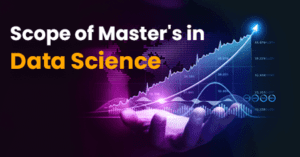
Introduction:
Data Science Master Programs are advanced academic degrees that provide students with the knowledge and skills to derive significant insights from large amounts of data. These programs, which have their roots in multidisciplinary areas like computer science, statistics, and business, aim to seek out experts who can turn raw data into intelligence that can be put to use.
Details:
- 1. Curriculum:
The curriculum of Data Science Master Programs has been carefully crafted to include a wide range of topics. Machine learning, statistical analysis, data visualization, and database management are common core courses. Students may be able to specialize in fields such as natural language processing, deep learning, or big data analytics through electives.
- Practical Experience:
A key component of these programs is their practical application. Students frequently work on real-world projects, conducting research projects, or cooperating with business partners. This practical expertise is very helpful in bridging the knowledge gap between concepts and real-world problem-solving.
- Faculty Understanding:
Frequently, the faculty members’ expertise determines how well these programs work. Academic and industry-trained faculty members with various experiences and backgrounds give students a well-rounded view and the most recent information about the industry.
Skills Learned in Master’s Programs in Data Science:

- Technical skill:
Students graduate with a solid understanding of programming languages like Python or R and skills in using tools and frameworks like TensorFlow or PyTorch for machine learning applications.
- 2. Statistical Acumen:
Master’s programs stress statistical approaches, allowing students to critically examine data, develop meaningful findings, and make data-driven decisions.
Effective communication is prioritized over technical proficiency.
- Problem-Solving Ability:
Solving real-world problems is at the heart of data science. Students who enroll in master’s programs learn how to approach problems methodically and use data to find solutions.
Scope

- Demand in the Industry:
Data scientists are in high demand as businesses increasingly appreciate the usefulness of data. Graduates can find work in a variety of fields, including banking, healthcare, and e-commerce.
- Adaptability:
These programs provide professionals with adaptable abilities that allow them to adapt to changing technology and face a variety of difficulties.
Graduates can go on to work as data scientists, machine learning engineers, business intelligence analysts, or data engineers.
- Research Opportunities:
For those interested in research, a master’s degree gives openings to further study or opportunities in academia.
Data knows no borders, and data scientists are in demand globally. Graduates of reputable Data Science Master’s programs find opportunities in various countries, contributing to the globalization of this field
Conclusion
A Master’s in Data Science is a gateway to a world where data-driven insights shape the future. From honing statistical skills to mastering machine learning, these programs offer a comprehensive education that empowers individuals to navigate the complexities of the data landscape. As industries increasingly rely on data, the scope for data scientists is boundless, making a Data Science Master’s program a strategic investment in a career poised for continuous growth and impact.
 Data Science in Digital Marketing Data Science in Digital Marketing: Mechanism Examples, Benefits Data Science Meets Digital Marketing Magic
Data Science in Digital Marketing Data Science in Digital Marketing: Mechanism Examples, Benefits Data Science Meets Digital Marketing Magic
